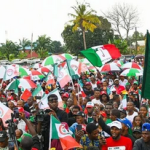For nearly two decades, Palestinian leadership has been fractured. Along with a basic division between Hamas in Gaza and the Palestinian Authority in the West Bank, numerous other groups have competed for influence. In late July, leaders of all 14 Palestinian political factions, including Fatah and Hamas, met in Beijing to issue a call for national unity. The agreement they signed, known as the Beijing Declaration, promised to create a consensus government presiding over both the Gaza Strip and the West Bank, to reform and expand the Palestine Liberation Organization (PLO), and to hold national elections....READ THE FULL ARTICLE HERE ▶▶
Such proposals are not new and largely reiterate the principles set out in previous reconciliation accords. But they have taken on much greater urgency in light of Israel’s unprecedented war on Gaza. As of mid-August, the Israeli assault launched in response to the October 7 Hamas attack on Israel had killed more than 40,000 Palestinians— mostly women and children—forcibly displaced two million people, and reduced most of the territory to rubble. It has become the deadliest moment in Palestinian history and the most destructive episode in the century-old Israeli-Palestinian conflict. Amid this crisis, the Beijing Declaration provides a road map to a different Palestinian future, one with credible leadership and functioning political institutions that will be essential for the day after the war.
Yet despite the gravity of the situation, Mahmoud Abbas, the longtime president of the Palestinian Authority and leader of Fatah in the West Bank, has—through a spokesman—disparaged the Beijing Declaration as unhelpful and insignificant. (Abbas sent a Fatah representative to the talks in his place.) It is puzzling that a political leader, especially one as deeply unpopular as Abbas, in a moment of national trauma and existential despair, should show such open contempt for a display of national unity. Perhaps he sensed that Hamas’s back was against the wall and thus felt no sense of urgency to share power with the group. Or maybe he did not want to defy U.S. and Israeli officials, who, in the wake of October 7, are dead set against any political accommodation with Hamas. Either way, Abbas’s arrogant dismissal of the plan highlighted two hallmarks of his nearly 20 years in power—a profound disconnect with his people and an unwillingness to promote a coherent strategy for Palestinian liberation. If the Palestinians’ painful history has taught them anything, it is that bad things happen to them when they don’t have credible leaders. Such is the case with Abbas today.
Once seen as a promising peacemaker and political reformer, Abbas has steadily devolved into an erratic and small-minded authoritarian with a virtually unbroken record of failure. Although some of these setbacks were the result of forces beyond his control, particularly during the first few years of his rule, most have been self-inflicted. A short list of these own goals would include letting a debilitating internal political schism fester, creating an environment of growing corruption and authoritarianism, and, what is most crucial, failing to put forth a coherent strategy for national liberation. Nowhere have Abbas’s shortcomings been more evident—and consequential—than in Gaza, home to roughly 40 percent of all Palestinians under Israeli occupation and from which his own Palestinian Authority was expelled by Hamas in 2007. Abbas has consistently avoided dealing with Gaza’s problems, allowing the territory to paralyze internal Palestinian politics and repeatedly foil peace negotiations.
Now, amid a terrible and unending war, Abbas has an opportunity to mitigate some of the damage done to Palestinians and to his own legacy by pursuing Palestinian unity. And yet even at this most decisive moment in Palestinian history, Abbas remains a helpless bystander, with little say in either war or peace. Of course, he was not solely to blame for the neglect of the Palestinian question, which led to the October 7 attack—Hamas, Israel, the United States and even the peace process itself all undoubtedly played a role. But Abbas’s deficient leadership contributed to the conditions that precipitated the war, and his lacking vision for the future is helping to sustain it now.
Setback After Setback
The problems with Abbas’s leadership of the PA have a long history. His tenure got off to an auspicious start in January 2005, following the death of Yasir Arafat, the PLO chairman and founding president of the PA who had towered over Palestinian politics for decades. But Abbas was quickly confronted by one setback after another. Two key developments in particular—the failure of Israel’s unilateral disengagement from Gaza in late 2005 and the collapse of the national unity government and ensuing civil war in Gaza in 2007—effectively doomed his leadership. Abbas had come to office focused on the twin goals of unifying the fractious Palestinian factions under his rule and securing a peace deal that would end decades of Israeli occupation and lead to an independent Palestinian state. Unlike Arafat, who often sought to leverage political violence, Abbas was firmly committed to diplomacy. Indeed, the soft-spoken, grandfatherly Abbas, who will turn 89 in November, was everything his larger-than-life predecessor was not. Abbas was decidedly uncharismatic and notoriously averse to crowds. His disposition was more that of a school headmaster than the leader of a liberation movement.
Within a month of taking office, Abbas was able to unite the various Palestinian factions to back a cease-fire agreement with Israeli Prime Minister Ariel Sharon, quietly ending more than four years of bloodshed during the second intifada. Abbas hoped to use the calm to lay the groundwork for diplomacy, but Sharon had no interest in a peace process. Instead, he put forward a radical plan to unilaterally withdraw from the Gaza Strip, a move that was aimed not at advancing a two-state solution but rather, as Sharon’s chief of staff Dov Weissglas described it, at putting Palestinian statehood in “formaldehyde.” Israel effectively closed Gaza’s borders, sending its economy into a tailspin. The failure of Israel’s unilateral disengagement, although not Abbas’s fault, set off a chain of events from which he would never recover.
To begin with, Hamas’s surprise electoral victory in national elections in January 2006 effectively ended four decades of Fatah dominance over Palestinian politics. This was a major blow not only to Abbas but also to the U.S.-led peace process. Although Abbas hoped to encourage Hamas’s political moderation, the United States and Israel adopted a zero-sum approach to the group, which they designated as a terrorist organization: they categorically refused any dealings with Hamas until it laid down its arms and recognized Israel. As Israel withheld tax revenues that made up the bulk of the PA’s budget, the United States imposed an international boycott of the new Hamas-led government, devastating the Palestinian economy and briefly pushing the PA to the brink of collapse.
Hoping to diffuse the crisis, Abbas struck a unity deal with Hamas in February 2007, known as the Mecca accord, in which Hamas agreed to relinquish control over most PA ministries to Fatah. Although the deal was backed by Saudi Arabia and Washington’s other Arab allies, the United States and Israel continued to reject any arrangement that allowed Hamas to remain in government. Instead, the Bush administration pressed Abbas to dissolve the government and call for new elections, an extraordinary and unconstitutional move. Abbas was faced with an impossible choice—either overturn the results of a democratic election and trigger a civil war or risk indefinite international isolation and the eventual collapse of the PA. As U.S. and Israeli pressure mounted, fighting broke out between Hamas and the PA in June 2007, ending with Hamas’s forcible takeover of Gaza and the expulsion of the PA from the territory. A humiliated Abbas dissolved the putative unity government and accused Hamas of staging a coup in Gaza. Israel rewarded Abbas by lifting its siege of the West Bank and punished Gaza with a full blockade.
The collapse of the Mecca accord and the ensuing civil war of 2007 solidified the emerging divisions in Palestinian politics and ensured continued instability in Gaza. It is unclear whether the United States and Israel were prepared to bring down the PA and the entire edifice of the Oslo accords in order to keep Hamas out of Palestinian politics. But by prioritizing the demands of a U.S.-led peace process over national unity, Abbas guaranteed that he would have neither.
The split with Hamas left Abbas’s leadership permanently hobbled— too weak to be a credible peace partner and too dependent on the United States and Israel to pursue meaningful national unity. This became evident almost immediately, with the relaunch of peace negotiations in Annapolis in late 2007. The talks lasted a year, until war broke out between Israel and Hamas in December 2008. At the time, this was the deadliest conflict that had ever taken place in Gaza and the first of several bloody wars in the years that followed. The Israeli offensive, which left some 1,400 Palestinians and 13 Israelis dead, seriously eroded Abbas’s support. Many Palestinians now regarded him not only as powerless to stop the assault but also, given his feud with Hamas, as complicit in it.
Months later, Abbas was forced to relive the nightmare following the release of the Goldstone report, a UN-commissioned investigation into the Gaza war of 2008–9, which accused Israel and Hamas of committing war crimes. When the Goldstone report came up for a vote in the UN in late 2009, Abbas came under intense U.S. and Israeli pressure to ask his allies to delay the vote, which he did, setting off a firestorm. For many Palestinians, Abbas’s willingness to abandon the Gazans who were killed in the war as well as relinquish a crucial piece of leverage against their Israeli occupiers was tantamount to treason. Despite Abbas’s attempts at damage control, including a halfhearted offer to resign, the Goldstone debacle marked a new low point in his presidency. Now politically paralyzed, Abbas spent the next year avoiding U.S. entreaties to resume direct negotiations with Israel, agreeing only to participate in indirect “proximity talks,” in which U.S. officials communicated separately with Palestinian and Israeli negotiators. Even after Washington managed to convince Abbas to relaunch direct negotiations in September 2010, they collapsed within only a few weeks.



